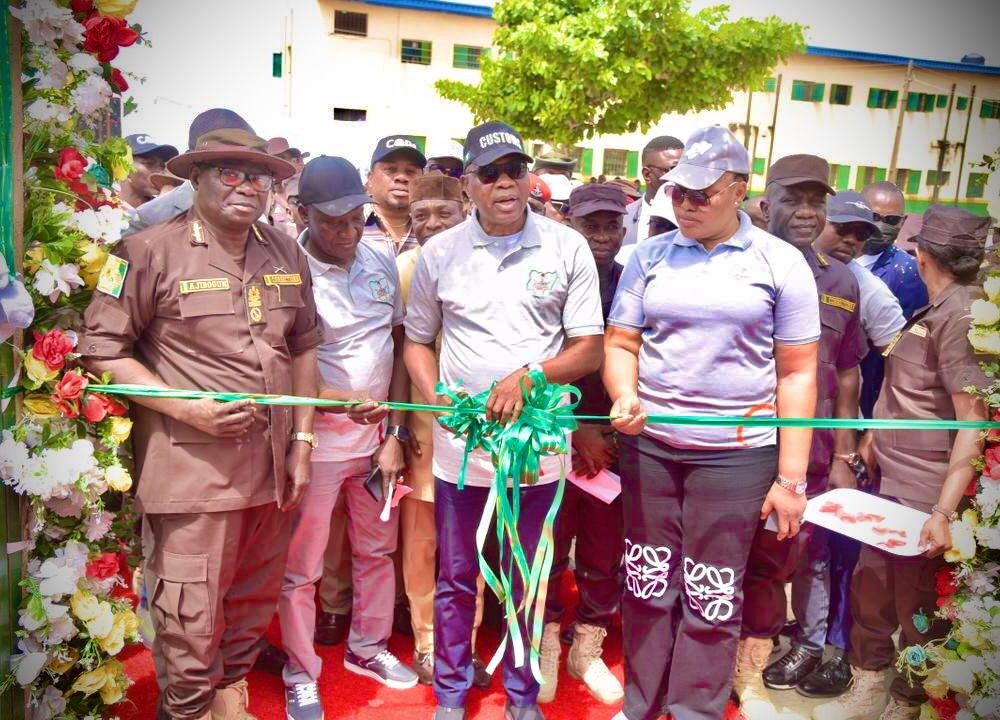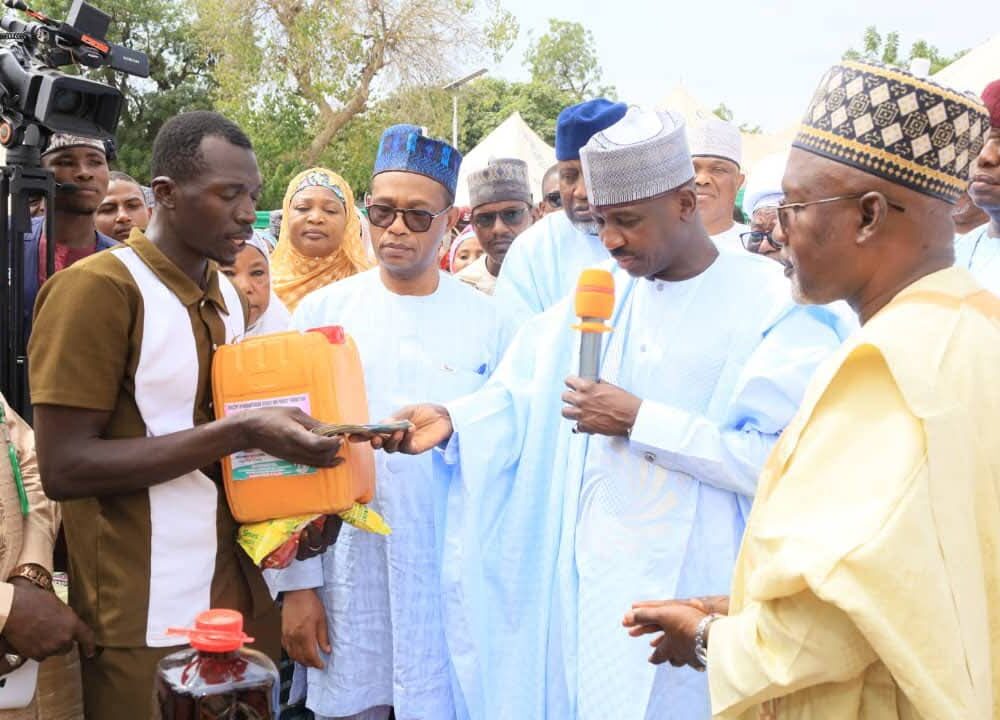Like it did last year offering a range of tax incentives to Nigerians through the Finance Bill later passed into law, the Buhari administration is again offering more this year through the 2020 Finance Bill so as to attract more incentives and make doing business in Nigeria more competitive.
Vice President Yemi Osinbajo, stated this on Friday at the third edition of the Nigeria Diaspora Investment Summit which was held virtually, featured several Nigerians and prospective investors from the Diaspora.

Speaking specifically about how the Federal Government has been able to use the 2019 Finance Act to improve the business environment in the country, Prof. Osinbajo said “what we have done in furthering our own economic policy is to attempt to make the fiscal environment as attractive as possible. What we have done is to use the instrumentality of the Finance Acts to make or propose significant reforms.”
Highlights of the tax incentives in the proposed 2020 Finance Bill include:
1. Reduction in duties on tractors from 35 to 10 per cent
2. Reduction in duties on motor vehicles for the transportation of goods from 35 to 10 per cent.
3. Reduction of levy on motor vehicles for the transportation of persons (cars) from 35 per cent to 5 per cent.
4. Exemption of small companies from payment of education tax under the Tertiary Education Trust fund (TETFUND)-companies with less than N25m turnover are eligible
5. 50 per cent reduction in minimum tax; from 0.5 per cent to 0.25 per cent for gross turnover for financial years ending between January 1st, 2020 and December 31st, 2021.
6. Granting of tax relief to companies that donated to the COVID-19 relief fund under the private sector coalition (CACOVID).
7. Introduction of software acquisition as qualifying capital allowance.
Prof. Osinbajo emphasized that “the Finance Bill looks at several fiscal issues that we want to legislate on or amendments we want to make in the law, which would make it easier for us to implement the budget and also to ease the fiscal environment or make the fiscal environment friendlier. So, we started passing the Finance Act from last year and now we are proposing a second Finance Act this year.
“Last year, we passed a legislation giving small companies with a turnover of less than 25 million a year, tax exemption from the Companies Income Tax, while medium-sized companies with their turnover of between N25 million to a N100 million now pays Companies Income Tax at the lower rate of 20%. And then, services provided by Micro Finance Banks are completely exempted from VAT. So, no microfinance bank pays VAT now for its services. Withholding tax rates, also on roads, on bridges, on buildings, power plant construction contracts have been reduced from 5% to 2.5%.”
He further explained “those who are doing construction contracts and proposing for construction contracts, pay a reduced rate, they no longer pay 5% they now pay 2.5%.
“Now in the proposed 2020 finance bill, we have gone a bit further, we are reducing by 50%, the minimum tax rate. So the minimum tax rate used to be 0.5%, now is reduced to 0.25% for gross turnover for the financial years ending between January 1st, 2020 and December 31st, 2021. So we have reduced the minimum tax rate by 50%, by half.”
While making the point about the exemptions from education tax, the Vice President added that “we have exemption of small companies, with less than 25 million turnover from payment of the 2% educational tax under the tertiary Education Trust Fund. What we are saying now is that for companies that have a turnover off less than N25 million, they are no longer required to pay that 2% tax for the education tax fund so their tax burden is reduced.”
With regards to the provision for software acquisitions, the Vice President said “when companies acquire software for their company operations, in the past, that was treated as an overhead. Now we are going to treat it as a qualifying expenditure for tax deduction to improve the ease of doing business.”
On government’s efforts to generate jobs and create opportunities for income generation through the Economic Sustainability Plan (ESP), Prof. Osinbajo said “in response, we designed an ambitious N2.3 trillion Economic Sustainability Plan and the focus of that plan is on creating jobs, first by the Mass Agriculture programme where already we have enumerated 5 million farmers and geo-tagged them to their farm lands.
“Also, a Mass Housing programme where we are building 300,000 homes in all States of the Federation using local materials and using small to medium-sized construction companies and using direct labour.
“All of these locally produced. The whole idea is to generate jobs, generate opportunities and income in every locality that we are functioning in.”
In addition, the Vice President noted that “we also have a solar programme to make 5 million connections across the country. In other words, we are going to be putting 5 million Solar Home Systems across Nigeria that will service in all, about 25 million individuals.”
He then commended the contributions of the Nigerian diaspora community in the development of the country, the Vice President noted that “our diaspora is one of our most vital resources, a literarily endless reservoir for talent, trade, investment, tourism, education, culture and sport opportunities.”
“But perhaps more important is the sheer range of well trained, honed and experienced talents that our diaspora represents. It is that potential not remittances that make our diaspora network an endless source of economic hope and social aspiration,” Prof. Osinbajo added.
He also acknowledged the efforts of the CEO of the Nigerians in Diaspora Commission (NIDCOM) Hon. Abike Dabiri-Erewa, particularly in harnessing the resources and talents of Nigerians abroad, the Vice President said “the diaspora initiatives that we have, and all of your efforts are certainly appreciated and will result to a stronger economy for Nigeria and a better country.”
In her opening remarks, the Chairman Nigerians in Diaspora Commission ,Hon.Abike Dabiri-Erewa highlighted objectives of the summit which she said is geared towards increasing diaspora investment in Nigeria.
“The objective of this summit is to establish a platform where Diaspora Investors can interact with potential sponsors, partners, collaborators and government agencies with a direct roundtable deals for mutual benefits”.
According to her in addition to the fact that the summit will strengthen investment profile, expand business network and provide an opportunity to showcase global best practices, it will “provide opportunity to meet key decision makers and industry influencers, brand exposure and many more that will help you in contributing to National development. As we are all aware, Nigeria is our country and it is important to bring together all expertise from various fields especially from the diaspora to develop Nigeria”.
Dabiri-Erewa attested to the fact that Nigerians in Diaspora are experiencing increased ease of doing business.
The Summit Coordinator Dr Badewa Adejugbe-Williams,in her welcome address said:
“It gives me great pleasure to welcome you to the 3rd Nigeria Diaspora Investment Summit convened by the Nigeria Diaspora Summit Initiative (NDSI) in collaboration with Nigerians in Diaspora Commission(NIDCOM) with the theme “Post-Covid EconomyResurgence: Targeting Diaspora Investment”
“This is the first ever Virtual Diaspora Summit due to the Corona Virus Pandemic which has caused a halt to large event in the world and has resulted to programme organizers organizing online gatherings. I am most impressed that you all took time out to participate in this Summit regardless of the differences in time zone.
This simply shows the resilience of Nigerians in Diaspora and at home in seeing a new Nigeria in bringing about national development to their country.
*In her welcome address,the Summit Coordinator, Dr Badewa Adejugbe-Williams said the summit was a culmination of an enormous effort which began in the year 2018 with the aim of actualizing the Federal Government Economic Recovery growth plan in encouraging multichannel investment options, and in recognition of the Diaspora as being one of the best groups to connect with when designing strategies for attracting Foreign Direct Investment (FDI).
“From that moment, many institutions and individuals have contributed in one form or the other towards the organization and the success of this yearly summit. I should like to take this opportunity to express my appreciation to this institutions and individuals, most especially His Excellency the President of the Republic for the constant firm support for this summit.
” the theme “Post Covid 19 Resurgence: Targeting Diaspora Investment” is apt, especially at this era when the Corona Virus Pandemic has affected both the human and material resources of all Nations.
“We need our Diaspora Community more than ever before because they possess the pertinent resources and are at the cutting edge of technology and development. There is no doubt therefore that our Nigerian Diaspora are an asset to their host countries and Nigeria in terms of their resources, skills and talents”.
Badewa further stated that the engagement of Nigerians in Diaspora in resurging the economy was more pertinent now as the post COVID-19 economy recovery plan required global best practices for which the Diaspora were best suited.
“In addition to being recognized as the source of significant resource flows to countries of origin or heritage through remittances, the Nigeria Diaspora need to be seen and should also be encouraged to see themselves as significant social investors in the development of the country.
“This in turn creates potential opportunities for governments, financial institutions, and the private sector to harness and scale up these investments for economic growth. This 2-day Virtual Summit is therefore aimed at creating an avenue for prospective, meaningful and sustainable Diaspora Investment to be relied upon to boost economic growth in Nigeria and also about ensuring that the Nigerians at home and the Nigerians in the Diaspora works together closely to develop a great country.
“Specifically the Summit will be focusing on the following sectors: Healthcare; Education; Agribusiness; Creative, Entertainment & Sports; Telecommunication; ICT/Fintech; Manufacturing; Real Estate. This virtual summit will showcase the investment opportunities available in these sectors and the development framework put in place to make investing in Nigeria more attractive to Nigeria Diaspora investors.
“It is my belief that sustenance of this yearly event will continue to encourage the Diaspora community in giving them a sense of belonging to contribute their quota in enhancing productivity of the national economy, and in the immediate long run contribute towards the needed sustainable development of the country”.she added.
The investment summit is an annual feature of the Nigerians in Diaspora Commission (NIDCOM).










